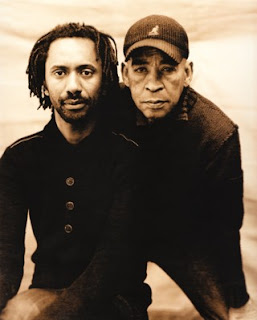Well, we move on to Mauritania. Another style of musick
raises its holy head in praise…Griot. Historically in Western
Africa, the role of the professional musician was reserved for
those born into the Griot caste. Although this hereditary lineage exists yet
today, the role of the musician is no longer held by the griots exclusively.
However, the living archive of speech & song they present maintains oral
traditions, both local & epic. The West African griot is a troubadour, the
counterpart of the medieval European minstrel. They are taught by the elders in
the tradition. They are trained over many years to learn the enormous quantity
of traditional songs, to master the age-old melodies & rhythms. A griot
might be required to sing seven generations worth of a tribe's or family's
history, in some cases to be completely familiar with the ritual songs necessary
to summon spirits & gain favor of ancestors.
Malouma Bint Moktar Ould Meidah was born in the sixties in Mederdra, Mauritania,
a small town & commune in south-west Mauritania, into a family of
griots. Her life seemed all mapped out. The daughter of Moktar Ould Meidah, a
prominent traditional musician as well as a highly skilled poet, she is also
the granddaughter of Mohamed Yahya Ould Boubane, another virtuoso of words
& the tidinit. She grew up in Charatt, where her parents taught her the
basics of traditional ardin harp playing.
She started to sing at a very young age, and performed for the first time at
the age of 12. She drew her inspiration from the traditional repertoire that
her parents had taught her. At the age of fifteen, she was already an
accomplished griot, not only accompanying her parents but performing whole concerts
on her own. About this time she started to listen to songs by Oum Kalthoum,
Adbel Hlim Hafez, Fairouz, Nasri Cherns, Dine, Sabah
& other great African musicians. She also discovered another musical style
that was not far from the music she had already mastered… the blues.
It took until the late eighties for her to appear on stage again in Mauritania with a new repertoire that brought about a true musical revolution among singers & disrupted the established order. Malouma’s aim was to create a style that drew from the purest time-tested traditions & yet modernize it. Now the subject of her material opened onto modern Africa; singing for the AIDS campaigns; for the vaccination of children; for the elimination of illiteracy; & for the equal rights of women.
Though it has taken time
to loosen the rigid walls of traditional griot music, it's easy to understand
why Malouma now is revered in her native Mauritania. From the griot
tradition, she's a stunning singer, whether on traditional or modern songs. She
flawlessly mixes both idioms. Sometimes she utilizes a large number of
musicians, sometimes a full band, just as often it is just her singing as her
brother plays the tidinit. Sometimes she dives headlong into those Saharan
desert blues propelled by a roaring guitar as her ululating voice surges over the
chorus, bringing Africa & the Mississippi
Delta to one single place. Her first album, Desert of Eden.
There’s a griot going on over here.
Malouma – Desert of Eden,
Shanachie 64088, 1998.
decryption code in comments
Tracklist –
Ya Habibi (My Love)
Maghrour (Your Friend Is
Mistaken)
Eden
Ya Maliha (Sublime
Beauty)
Outhkouri (Remember)
Jrad (Locusts)
Rasm (Engraving)
Soura (Photo)
Ayyam Zaman (The Days of
Time)
Fa-Fa-Fa-Fa-Fa (Sad
Song)
Habibi Habeyytov (I Love
to Love My Love)
Cheikh M’Backe
El Vahiz (The Victorious
One)
Daby Touré was born in 1970 in Djeole, Boutilimit, Mauritania. He is the
son of musician, Hamidou Touré. In 1989 Daby accompanied his father to Paris, France, where Hamidou
was joining his brothers’ band Touré Kunda. Daby loved the life of a musician
& with music in his blood, he chose a career in music. With his cousin,
Omar Touré, he formed the group Touré Touré. Touré’s songs are based on
traditional Mauritanian & African traditional sounds. He sings in Wolof,
Soninké & Pulaar as well as French and English.
Well, anyone familiar
with my musickal bent has heard plenty of Skip McDonald here at NSS. I’ve posted
up a bit of On-U Sound, of which he is always a vital part: Fats Comet; Tackhead; Bim
Sherman; Singers & Players; Little Axe…you get the idea. When I found out
he had teamed up with Daby Touré, a thirty-something wunderkind of musickal
expression from Mauritania, West Africa, I knew this was one of the things I would
provided for all you fine folks. Then, of course, Skip snuck in his old partner
in crime, drummer Keith LeBlanc just to sweeten the deal.
Call My Name captures
the magic of this unique creative union, with songs, some by Touré & others
by McDonald, transformed by way of imaginative, instinctive collaboration to a
higher power.
Daby Touré & SkipMcDonald - Call My Name, Real World Records, 2009.
decryption code in comments
Tracklist -
Past Time
Sinners
Lost Voices
Will You Call My Name?
Time Has Come
Riddem
If you don’t enjoy this,
you be dead, Jim.
NØ







Malouma
ReplyDeleteKLsuLGObdOhx51O0LuzMfS4sWz5aXdHACWdxyFJtOWU
Call My Name
bBJNdmzGa1HwTL7tpKEhBT2uuBYMfm-EhcXBUttH13g
I have some great Mauritania guitar works...when I get a chance I'll up them and post them in a comment here. Hammadi ould nana and some other stuff. Just don't have the time at the moment to track them down.
ReplyDeleteBe looking forward to it. Everything else you've pointed out is spot on. Thanks again, my friend.
Delete